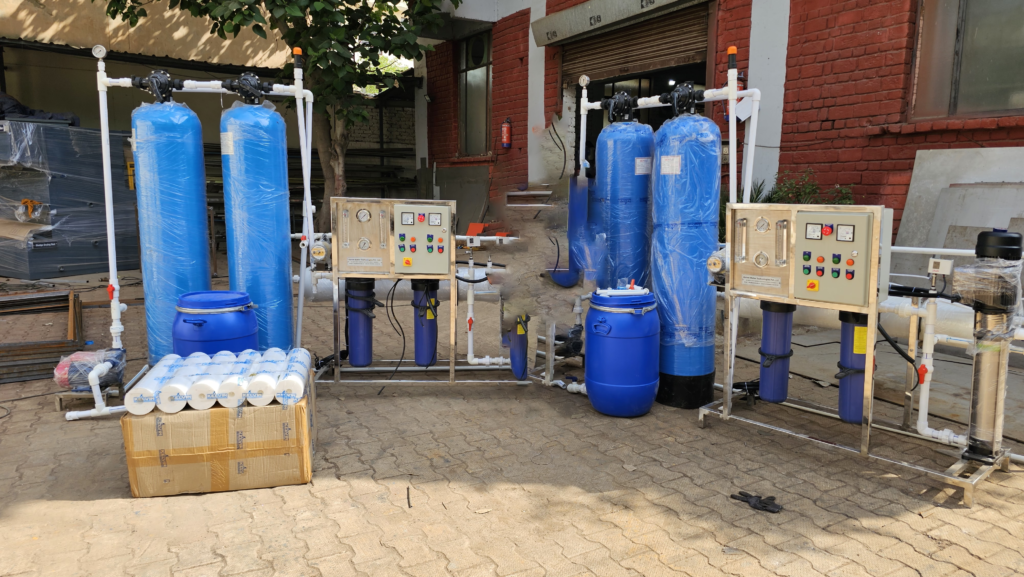Importance of Industrial RO Plants

Industrial RO Plants are sophisticated water treatment systems designed to remove impurities and contaminants from water using the principle of reverse osmosis. This process involves applying pressure to push water molecules through a semipermeable membrane, effectively filtering out dissolved solids, ions, organic compounds, and other pollutants. The result is purified water that meets stringent quality standards, making it suitable for a wide range of industrial applications.
Advantages of Industrial RO Plants
- Water Conservation: One of the primary benefits of Industrial RO Plants is their ability to conserve water. By efficiently treating and recycling water, these plants significantly reduce the consumption of freshwater resources, easing the burden on local water supplies and contributing to sustainable water use practices.
- Cost-Effective Solutions: While the initial investment in setting up an Industrial RO Plant may seem substantial, the long-term cost savings are considerable. By reducing water wastage, lowering energy consumption, and minimizing the need for chemical treatments, RO plants offer a cost-effective approach to water management for industries.
- Compliance with Regulations: Industries are subject to stringent environmental regulations regarding water quality and discharge standards. It play a crucial role in ensuring compliance with these regulations by providing a reliable means of treating wastewater to meet required standards before disposal or reuse.
- Improved Operational Efficiency: Water quality directly impacts the efficiency and longevity of industrial equipment. By delivering high-quality water free from contaminants, It help maintain optimal performance levels, reduce equipment downtime, and extend the lifespan of machinery and infrastructure.
- Versatility and Scalability: Industrial RO Plants are versatile and can be customized to suit the specific water treatment needs of different industries and applications. Moreover, these plants are scalable, allowing for expansion or modification as production volumes or water requirements change over time.
- Environmental Sustainability: By reducing water wastage, minimizing pollution, and promoting responsible water management practices, Industrial RO Plants contribute significantly to environmental sustainability efforts. They help conserve natural resources, protect ecosystems, and mitigate the ecological impact of industrial activities.
Applications of Industrial RO Plants
- Manufacturing: Industries such as food and beverage processing, pharmaceuticals, chemicals, and electronics rely on Industrial RO Plants to ensure water purity for manufacturing processes, product quality, and regulatory compliance.
- Power Generation: Power plants, including thermal, nuclear, and renewable energy facilities, utilize RO technology for boiler feedwater treatment, cooling water purification, and wastewater recycling, enhancing overall efficiency and environmental performance.
- Textiles and Dyeing: The textile industry benefits from RO plants for treating wastewater from dyeing processes, removing colorants, salts, and other contaminants to meet discharge standards and reduce environmental impact.
- Automotive and Metalworking: It play a role in automotive manufacturing and metalworking operations by providing treated water for surface treatment, parts cleaning, cooling systems, and preventing corrosion in machinery.
- Mining and Petrochemicals: In mining and petrochemical industries, RO plants are utilized for treating process water, mine drainage, and wastewater generated during extraction, refining, and production activities, minimizing environmental footprint, and ensuring regulatory compliance.
- Hospitality and Institutions: Hotels, resorts, hospitals, educational institutions, and commercial complexes employ RO technology for potable water production, wastewater recycling, and maintaining water quality standards for various applications.
Challenges and Considerations
- Energy Consumption: The operation of RO plants requires energy, primarily for pumping water through membranes and maintaining pressure. Optimizing energy efficiency through system design, equipment selection, and process optimization is essential to mitigate energy costs and environmental impact.
- Membrane Fouling and Maintenance: Over time, membranes in RO systems can experience fouling due to accumulated particles, scaling, or biofouling, reducing efficiency and requiring regular maintenance and cleaning to ensure optimal performance and longevity.
- Brine Disposal: The concentrated brine or reject water produced during the RO process requires proper disposal or treatment to prevent environmental contamination. Strategies such as brine concentration, evaporation, or brine treatment technologies are employe to address this challenge.
- Water Quality Monitoring: Continuous monitoring of water quality parameters such as pH, conductivity, turbidity, and chemical composition is essential for maintaining RO plant performance, detecting potential issues, and ensuring water safety and compliance.
Future Trends and Innovations
- Smart Water Management: Integration of IoT (Internet of Things) technology and automation systems enables real-time monitoring, data analytics, remote operation, and predictive maintenance of RO plants, enhancing efficiency, reliability, and cost-effectiveness.
- Membrane Technology: Research and development efforts focus on improving membrane materials, designs, and coatings to enhance performance, reduce fouling, increase lifespan, and lower energy requirements, driving the evolution of next-generation RO systems.
- Energy Recovery: Adoption of energy recovery devices such as pressure exchangers, turbines, and pumps allow for the recovery and reuse of energy from brine streams, improving overall energy efficiency and reducing operational costs.
- Advanced Treatment Processes: Integration of advanced treatment processes such as membrane bioreactors (MBRs), nanofiltration (NF), and electrochemical processes with RO technology enables comprehensive water purification, resource recovery, and treatment of challenging contaminants.
- Circular Economy Practices: Embracing circular economy principles involves implementing closed-loop water systems, water reuse strategies, and resource recovery approaches within industrial operations, aligning with sustainability goals and minimizing environmental impact.
Conclusion
Industrial RO Plants play a vital role in sustainable water management by providing efficient, cost-effective solutions for treating water, reducing waste, ensuring compliance, and promoting environmental stewardship across various industries. With ongoing advancements in technology, innovation, and best practices, the future of it holds promise for driving positive impacts on water conservation, resource efficiency, and ecological sustainability in industrial sectors worldwide.